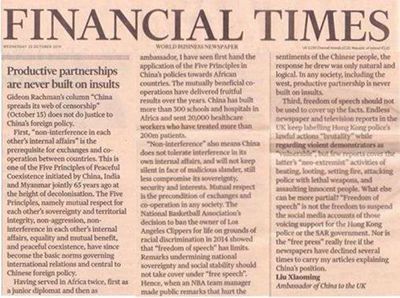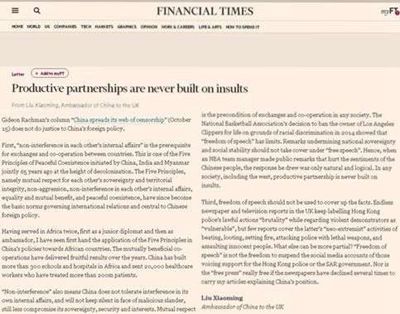|

On 23 October 2019, Financial Times published Ambassador Liu Xiaoming's letter to the editor under the title "Productive partnerships are never built on insults". The full text is as follows:
Gideon Rachman's column "China spreads its web of censorship" (October 15) does not do justice to China's foreign policy.
First, "non-interference in each other's internal affairs" is the prerequisite for exchanges and co-operation between countries. This is one of the Five Principles of Peaceful Coexistence initiated by China, India and Myanmar jointly 65 years ago at the height of decolonisation. The Five Principles, namely mutual respect for each other's sovereignty and territorial integrity, non-aggression, non-interference in each other's internal affairs, equality and mutual benefit, and peaceful coexistence, have since become the basic norms governing international relations and central to Chinese foreign policy.
Having served in Africa twice, first as a junior diplomat and then as ambassador, I have seen first hand the application of the Five Principles in China's policies towards African countries. The mutually beneficial co-operations have delivered fruitful results over the years. China has built more than 300 schools and hospitals in Africa and sent 20,000 healthcare workers who have treated more than 200m patients.
Second, "Non-interference" also means China does not tolerate interference in its own internal affairs, and will not keep silent in face of malicious slander, still less compromise its sovereignty, security and interests. Mutual respect is the precondition of exchanges and co-operation in any society. The National Basketball Association's decision to ban the owner of Los Angeles Clippers for life on grounds of racial discrimination in 2014 showed that "freedom of speech" has limits. Remarks undermining national sovereignty and social stability should not take cover under "free speech". Hence, when an NBA team manager made public remarks that hurt the sentiments of the Chinese people, the response he drew was only natural and logical. In any society, including the west, productive partnership is never built on insults.
Third, freedom of speech should not be used to cover up the facts. Endless newspaper and television reports in the UK keep labelling Hong Kong police's lawful actions "brutality" while regarding violent demonstrators as "vulnerable", but few reports cover the latter's "neo-extremist" activities of beating, looting, setting fire, attacking police with lethal weapons, and assaulting innocent people. What else can be more partial? "Freedom of speech" is not the freedom to suspend the social media accounts of those voicing support for the Hong Kong police or the SAR government. Nor is the "free press" really free if the newspapers have declined several times to carry my articles explaining China's position.

|

